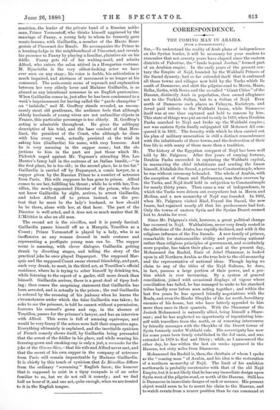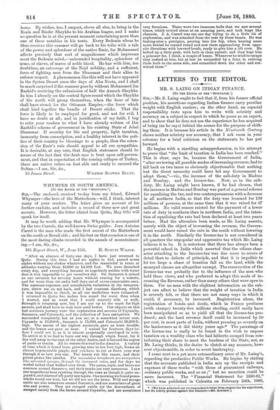CORRESPONDENCE.
THE COMING MAN IN ARABIA.
[FROM I CORRESPONDENT.]
SIR, To understand the reality of Arab plans of independence on the Syrian border, it will be necessary for your readers to remember that not seventy years have elapsed since the eastern districts of Palestine, the "lands beyond Jordan," formed part of an Arabian empire. In the early years of the present cen- tury the Empire of Nejd, founded by the Wahhabi Princes of the Saoud dynasty, had so far extended itself that it embraced all those towns and villages now held by the Turks which lie south of Damascus, and skirt the pilgrim-road to Mecca, Maan, Belka, Zerka, with Bozra and the so-called "Giant Cities " of the Hauran, distinctly Arab in population, then owned allegiance not to the Turkish Sultan, but to a Sultan of Nejd. Even north of Damascus such places as Palmyra, Karieteyn, and Jerud paid tribute to the Wahhabi Imam, while Damascus itself was at one time captured and held to ransom by him. This state of things was put an end to only in 1818, when Ibrahim Pasha marched to Nejd and broke up the Wahhabi empire ; nor was eastern Syria finally subjugated till Mehemet All con- quered it in 1831. The ferocity with which he then carried out his plan of military annexation is still a distinct remembrance with the inhabitants of these towns, and the destruction of their free life is with many of them more than a tradition.
The history of the Egyptian conquest of Nejd has been well told by Mr. Palgmve. After five years of varying fortune, Ibrahim Pasha succeeded in capturing the Wahhabi capital, in massacring the chief inhabitants and sending the imam himself, Abdallah ibn Saoud, a prisoner to Constantinople, where he was without ceremony beheaded. The whole of Arabia, with the exception of Oman and Hadramaut, was then overrun by the Turks, and Nejd itself held in subjection to Constantinople for nearly thirty years. Then came a war of independence, in which the Turks were driven out everywhere but in Mecca and Medina, and a new monarchy of Nejd was founded. In 1862, when Mr. Palgrave visited Riad, Feysul ibn Saoud, the new Imam, had regained nearly all that his predecessors had lost. Only the towns of eastern Syria and the Syrian Desert seemed lost to Arabia for ever.
Since Mr. Palgrave's visit, however, a great political change has occurred in Nejd. Wahhabiism, never very firmly rooted in the affections of the Arabs, has rapidly declined, and with it the religious influence of the Thu Saouds. A new family of princes, remarkable for statesmanlike ability and professing national rather than religious principles of government, and so infinitely more popular, has taken their place ; and at the present day, Mohammed ibn Rashid, Emir of Jebel Shammar, is looked upon in all Northern Arabia as the true heir to the old monarchy and the representative of national ideas. Though laying no claim to any of the titles of the Nejd Sultans, he does, in fact, possess a large portion of their power, and a por- tion which is ever increasing. By a system of general conciliation, joined with occasional displays of vigour where conciliation has failed, be has managed to unite to his standard tribes hardly ever before seen acting together ; and within the last five years he has opened friendly negotiations with the Roala, and even the Bisshr Sheykhs of the far north, hereditary enemies of his house, but who have latterly appealed to him more than once in their quarrels. With the Shammar of the Jesireh Mohammed is naturally allied, being himself a Sham- mar; and he has neglected no opportunity of ingratiating him- self with travellers from the north, or of renewing intercourse by friendly messages with the Sheykhs of the Desert towns of Syria formerly under Wahhabi rule. His sovereignty has now for some years been firmly established in the Jof oasis, and was extended in 1878 to Kaf and Ittery ; while, as I announced the other day, he has within the last six weeks appeared in the Haman, not sixty miles from Damascus.
Mohammed ibn Rashid is, then, the chieftain of whom I spoke as the " coming man " of Arabia, and his idea is the restoration of a northern monarchy of Nejd. The limit of his ambition northwards is probably coextensive with that of the old Nejd Empire, but it is not likely that he has any immediate design upon Syria west of the pilgrim-road, or north of the Hauran. Still less is Damascus in immediate danger of sack or menace. His present object would seem to be to assert his claim to the Hauran, and to watch events from a nearer position than he can command at home. He wishes, too, I suspect, above all else, to bring in the Roala and Bisshr Sheykhs to his Arabian league, and I make no question he is at the present moment entertaining more than one of these notables in his tents. Every Bedouin whom he thus receives this summer will go back to his tribe with a tale of the power and splendour of the native Emir, for Mohammed affects precisely that sort of magnificence which impresses most the Bedouin mind,—unbounded hospitality, splendour of arms, of slaves, of mares of noble blood. He has with him, too doubtless, an entourage of the Nejd nobility, and a sufficient, force of fighting men from the Shammar and their allies to enforce respect. A phenomenon like this will not have appeared in the Syrian Desert since the days of Abu Nocta, and I shall be much surprised if the summer goes by without Mohammed ibn Rashid's receiving the submission of half the Anazeh Sheykhs. In him I already see the central figure round which the Sheykhs of the north will group themselves, when the hour of fate shall have struck for the Ottoman Empire,—the force which shall bind together the bundle of Desert sticks. That the force is likely to be employed for good, and not for evil, I have no doubt at all ; and in justification of my faith, I beg to refer, your readers to what I have already written of Ibn Rashid's scheme of government in his existing State of Jebel Shammar. If security for life and property, light taxation, immunity from conscription, and a healthy interest in the poli- tics of their country be blessings to a people, then the exten- sion of the Emir's rule should appeal to all our sympathies. It is desirable, at any rate, that English statesmen should be aware of the fact that the•Arab race is bent upon self-govern- ment, and that in expectation of the coming collapse of Turkey, there are native rulers on foot able and ready to succeed the Sultan.—I am, Sir, &c.,



































 Previous page
Previous page